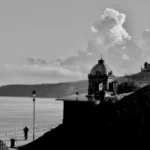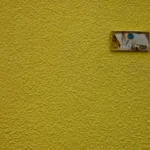This chapter introduces you to the Four Crosses Hotel, its owner elegant Mrs Maeve Morgen who our protagonist, Laurie Gonne must deliver a letter too. Little does Laurie know, which is unlike them.
Ireland makes itself present. As does Sydney Australia, where I lived for a decade. You will get to meet the bellhop, Little Cartey. She’s one of the characters I enjoyed writing more than others. She’s bright, clever, and you might think that Laurie’s falling in love with her.
What went wrong with this chapter? It’s a bit of a ramble. A chunk of ideas spattered across the pages. Each chapter should be a machine for change in the plot or at least one character. I think that this chapter serves these purposes. But…
…it all starts to go a haywire from here on in.
The train remained empty or near as damn it. I played a disco compilation that reminded me of good times before when my hips fragmented, back when I shimmered and moved like molten crystal, when I was “an impossible achievement of grace and instinct”. Neil O’Neil, doctor of medicine so he claimed, said that last bit one night in Berlin or Buenos Aires, somewhere cool anyway. He wanted me so badly back then. I thought it was all a bit twee and heavy handed. Give me a ride in a private jet, a chug on some Juglar Cuvée, a snort of coke and I was probably yours for the night.
I wouldn’t have known true admiration if it had lapped at my fingers and died for me.
As the train rocked along, I drowsed, and rain started to pour down. I remembered the last thing my probation officer had said to me before I left the house. I’d told them I was going to Ireland to reconnect with my roots, relive beloved memories of family holidays. He reminded me that I needed to check in with the Garda Síochána every day. I’d said yes of course I would.
“Oh, you’re going to Ireland, I’m very envious”, he’d enthused. “What a magical island. All the marvellous characters you meet. Wonderful, just wonderful”.
He stamped and signed the documents that I needed to be stamped and signed.
“God yes”, I said.
“Magical, magical place”, he sighed dreamily, “I’ve been there once”. I looked deeply into his eyes, which he always enjoyed. I saw a weekend in Dublin. I saw the Book of Kells and Trinity College, the GPO, The Guinness Storehouse, St Patrick’s and Christ Church cathedrals, for Christ’s sake I even saw a snap of the white of Kilmainham Gaol where bad things had happened but let’s not start another fight over that.
I saw him ordering a Guinness and settling down near a roaring fire to listen to a group of relentless musicians bloating out rank Victorian folk music with fiddles, tin whistle and a bloody bodhrán. I didn’t hear mentions of ye Black and Tans, of The Boys of Kilmichael, of The Valley of Knockanure and definitely not The Men Behind the Wire. He’d never been in any danger of hearing rebel songs, so he was unable to imagine them. Fair play to Dublin’s tourist industry and its extraction of the pounds sterling.
I missed Ireland. I’d had good times there by the sea. Neil O’Neil had family there. He called them family anyway. Down between Cork and Waterford on the coast. Nice family. Lots of fine, fit lads.
A father and mother you didn’t ever want to get on the wrong side of. Especially came to the lads.
Shame I couldn’t go back, but people get murderously angry for all sorts of reasons in countrysides the world over. Culchies, Westies, Hicks and Bumpkins have spacious memories for even the slightest of grudges, and passing murderous grudges from generation to generation is both sacred and very, very popular; like watching soap operas or sports.
I woke up gently and easily as the train pulled into Crosschester. I stepped off the train into what I remembered as an inelegant, soot black bricked minor Edwardian railway station.
Crosschester station was brighter and cleaner than I remembered as a teenager when I’d hide there. Now I walked past shops selling socks, and other ones selling ties, and other ones selling books, sandwiches and drinks. Even the lavatories seemed from the outside at least to be hygienic and unexciting. Quite unmemorable.
My cloudy, or clouded I should say, recollections of Crosschester were drenched tediously in cheap beer, cider and spirits, all of it wreathed in cigarette smoke. Everything was soundtracked by pop songs, three minutes, sediments of sentiment sucking down bonfire smoked autumn afternoons into evenings into nights until all time folded into no time at all, no time left. A school for all the other cities and towns I eventually lived in. The tunes and the flavours changed. I tried to keep my head down. I wanted to get out of the station fast, as I didn’t want to be recognised by people, unlikely, or by ghosts.
“You toothsome little morsel” either that or the sound of the train pulling out. Every town has a voice doesn’t it? Someone’s voice, ancient or modern. I was shocked if this was in Crosschester though. I put it in Porthampton, down by the sea looking to France, not this backwater looking into itself. So, as the new fall bonfires of Crosschester draped damp smoke on me, I walked down Station Road towards town and to the Four Crosses Hotel. This was the address on the letter given to me by Jimmy the Phoenix in prison. I summoned up Dr Neil O’Neil’s voice.
“It’s cruelty to spend a day out in the harsh light of the world when you could be with your pals in the warm glow of a bar”.
Crosschester station was on a hill so I could see the cathedral that dominated the area and gave it its status as a city. Nearly a thousand years old; spiky and arrogant like the Normans who had designed it, it retained the martial glamour it had been designed to project. As I got out of the station, a gentle rain began to fall. As is usual with remote English stations, there were no taxis congregating outside. I did not have to wait, instead I set off in a brisk walk down town. This took me past brick built houses colonised by strangely coloured mosses and lichens. Their walls sweated onto pavements that were already saturated. I walked by several churches that looked warm and dry inside and I heard hymn-singing parishioners whose harmonising voices rose into the evening reminding the singers and me of childhood assemblies.
I was not tempted to join in.
I am tall so I strode down Station Road at what must have been a comical angle to a humorous observer. All tall people stride, it’s bestowed on us in the same way as portly people roll, and lithe people pirouette. I must have looked like a back-slash in the falling water. Just about retaining uprightness. The opposite of my real life.
The rain descended into a cloying mist. No thunderous drenching downpours for this city. There’s nothing so déclassé as a loud, invigorating drama in the seats of country gentlemen, circuit courts and storied cloisters, towns and cities like Crosschester that dotted the English countryside impregnated with the upper classic stench of Norman conquest. I pulled up the collars of my camel hair coat and pushed on, thankful for my sturdy boots – the kind that never went out of style. I was actually happy to be outside and walking.
There I was, a Modigliani misplaced in a Whistler painting, striding past a school that had maintained its signs for Girls and Boys. I walked past a sweet shop with colourful plastic candy jars in its wide bay window, something from a Charles Dickens’ postcard, something for the tourists, it hadn’t been there when I was young enough to care. Over the road I saw a policeman looking into the window of a florist, a damp romantic. He didn’t see me. The early fall evening was doused by orange street lamps. Unfit for brightness they only hinted at safety as the night drew in. In other words, it was getting dark. I was scared of one thing in this tiny town that always acted above its station.
If I needed to avoid going into the next pub I came to for a stiffener, and subsequently socialising and consequently going back to prison. I needed to find The Four Crosses hotel with ‘Owner, Mrs Maeve Morgen’. I vaguely remembered where a building with that name had been when I was growing up so, head-down against the rain, I sped up.
I strode past a woman walking with her small dog up the hill against the rain. Both of them looked extremely happy with their endeavour. I walked past three pubs, any of which I could quite happily have spent the rest of the night in. Very smart they were. Down and down into the guts of the town. I love going down: stairs, rollercoasters, escalators, even in planes I love the bump of landings. Going down and going down fast just works for me.
I should have said ‘The City’ because, despite its having become a tributary of the mainstream of English history centuries before my wet descent, the cathedral granted it the right to call itself ‘City’. Crosschester was and is a city in the same sense that the lady with the dog were mountaineers.
Station Road ran into Great Hall Road into Jewry Street and St James’s Lane, which terminated in a square of commercial buildings. The Four Crosses stood on its west side. Four storeys and a well polished, deep red set of double doors were guarded by two fat white pillars, tapering at the top and bottom rather like two giant porcini mushrooms.
It looked like the kind of place where you’d expect a doorman dressed like a Generalissimo to be stamping his feet and blowing into his white gloved hands. Instead there was an A-board that read: “Visit our **** restaurant – family deals assured – eat alone or with a friend!” I was hoping those symbols were supposed to be stars and not redactions. In I went.
There was nobody at the front desk of The Four Crosses so I headed into the bar. It was an amalgam of familiar places. The bar was made of highly polished oak with a brass foot rail that was a stage to anger or anxiety. It had four unpadded, high-stools in front. It reminded me of several small, ‘members-only’ bars. One was up a tight flight of filthy stairs in London’s tawdry Soho. Heterosexuals, homosexuals, pansexuals, asexuals, too-often-drunk to be sexual, and a very grey man in a very smart suit, rumoured to be ex-MI6, all fused with the furniture.
They drank Dubonnet and gin, maybe whisky and soda, which they called a Tom Collins and drank in dirty highball glasses. One or two of them still drank port and lemon. These drinkers were deeply acquainted with each other. A perfectly loose knit family. A before or after friendship to be treasured. They reprised the performances of characters they’d judged wanting when they first stumbled into the bar. A long time ago they were young and curious about the hidden dangers of a capital city. Sooner or later, with the inevitability of rotting apples into cider, they ended in each other’s arms or at the end of each other’s fists. Then they did it all again the next day.
The Four Crosses had the same turgid energy without the excitement of the city outside.
The general layout reminded of another members-only club, under the ground of Sydney’s Macquarie Street. Used and abused by lawyers, tabloid hacks, Japanese businessmen, elderly gay Kiwis, and people like me: tasty and gratifyingly expensive accompaniments to someone who dabbled forgettably in elicit sex.
That it was subterranean combined with its thick Hawkesbury sandstone walls to make it a cool place to have a few quiet ones in the heat of a Sydney afternoon. You entered its gorgeous, deep red gloom down a steeply spiralling staircase. Signed in a velveteen covered book using any old name. Paid five dollars to a tall, elegant, beautifully spoken Vietnamese-Australian, maybe a man, maybe a woman. Sometimes they’d stop you for a soft chat, during which you found out that they were definitely Vietnamese, and came over as a refugee. He discovered all sorts of things about you that you never really knew you were letting on to. Then you walked through a crimson and cerulean beaded curtain that shushed and sizzled behind you. You were in the perfectly square bar.
It had no sex to it, no musk. Instead it had cigarette smoke and low volume horse racing commentary on one TV. It had a betting booth, a T.A.B., lurking and ready to pounce in a corner near the rest rooms, perfectly placed for the desperate.
You could also get absolutely wonderful Japanese food there. The menu changed according to whatever went through the cook’s mind. No one ever saw the cook. No one ever heard the cook. Rumours riddled the walls that he had Michelin stars but was shamed from Europe for reasons of Bisto. Or she was a humble but miraculously talented Japanese okaasan; old, wise and once a comfort woman who kept to the shadows feeding strangers with all the love she herself had never felt.
I loved that food served in plastic bowls on low, square formica-topped tables. I loved its selection of wines, spirits, beers and poppers. It sighed with gossip, gossip; gossip that I didn’t understand but nevertheless listened to. A pick-up was almost guaranteed. What a place! What a digression.
Finally it took me to a bar with crumbling, honey coloured walls on a corner near the canal in Villette, Paris. Card players, newspaper readers, solitary shady men and women, shades, low voices, a magic jukebox. You were left alone no matter who you were or who you were in the company of. There were none of the characters that proliferate in other dives. People didn’t drink there as a performance or as a last resort, a replacement for love. Dr Neil O’Neil was a character. I drank in Villette to escape him.
What set the bar in The Four Crosses apart was that embedded in each wall, north, south, east and west were the heads of animals. All in beautiful condition. A fox to the east, a rabbit to the west, a deer’s head behind me to the south. The eyes of each animal were wide open and bright. Except for one. On the north wall behind the bar, with her left eye shut in mid-wink was the head of hare.
I breathed it all in, like it was a broken home to me. I wished I still drank alcohol.
One of the men at the bar looked me up and down and said in a tobacco gravelled voice, “Don’t you worry. She’ll be down toute de suite to check you out”.
“Check me in?”
“Yes, that too”, he returned to his conversation.
I was tempted to buy a drink. Just to see, and because the bar and all the bars before it insisted. It would have been so easy to join those others at the bar. They would have found a stool for me and my money. They would have slotted us in. Drinker was my first adult identity even before smoker, and quite a way before druggie. It tipped me over the lip of innocent adolescence into hellscape escapades. Sodden memories. Sodding memories. All the best places, all the best people, the best sex, the best stories, all of those are glamorous cocktails or dregs of other people’s glasses. I had no blood, sweat, spunk or tears. I was drink. I was drugs. I was wasted and I was waste.
I didn’t take a drink. I wasn’t open to death.
“Mrs Maeve Morgen, landlady, hotelier, entrepreneur, very pleased to meet you”
A middle aged woman appeared behind the bar. She wore a fitted green dress made of a fabric like tapestry. She had jet black hair built up like Elizabeth Taylor’s. Her face was peach-fuzzed. Her sharp blue eyes were made up like Cleopatra. I noticed that her hands looked beautifully, frighteningly strong.
“Here, this is for you, on the house, to say welcome to The Crosses”, her accent was Welsh. Her voice had authority.
She handed me a vodka and soda with ice and three thin slices of fresh and unwaxed lemon.
“I don’t drink, I’m sorry”, I added the apology because I was in England.
“Oh, treat yourself, you’re in a hotel; you’re on holiday after all. Cin! Cin!”
“When I say I don’t drink, I mean that I’m an alcoholic”, this usually lead to embarrassed mumbling or even silence.
“You only live once”, said one of the locals gaily.
“Enjoy life while you’re in it!”, said another.
“I’ll have it if you don’t want it, eh Maeve?”, croaked a third from the chorus.
Vodka and soda with three perfect slices of unwaxed lemon; three clear ice cubes. A pristine highball glass. It was so perfectly hateful. Trapped in the ice cubes were hours of rage, mayhem and regret waiting to escape via the medium of me.
“I really can’t go back now, not after all the work I’ve put in”, I said firmly.
Mrs Maeve Morgan took the drink back and said, “Of course you can’t. Once that grey prison pallor’s gone, you’re gorgeous. I respect your decision.
I didn’t bat an eyelid at her prison barb. Jimmy the Phoenix had given her the heads-up on me, obviously. I just nodded.
“Course you can’t drink it. Not after all the work”, said the first drinker.
“That would be a waste of time and energy”, said the second.
“Can I have that now, Maeve?”, chorused the third.
Maeve tipped the drink away, lifted the bar flap and stepped into the room. She had legs from the golden age of Hollywood. “Now let’s get you booked in”, she said. We walked into the foyer and to the front desk.
She stood behind the front desk and pulled out a blue velveteen covered guest register. My name was already there on the top of the page.
“You have a room at the top with a lovely view over the town, sorry, the city. Everything is paid for. And you have something for me.” Not a question. I handed over the envelope I’d been asked to deliver.
“Oh, very good, very good. Many thanks.” Maeve sliced it open with a stiletto knife she had too readily to hand. She read the contents, a single sheet of thin paper with writing on one side, handwriting, thin and large, it showed through. She replaced it in the envelope.
“We can talk about this later”, she said. That surprised me. I had no idea the contents concerned me in any way. I nodded anyway. She nodded back.
She rang a small bell. A very short, stocky woman dressed in classic red bellhop uniform shot diagonally across the chequered floor at speed, and picked up my suitcase.
“This is Little Cartey, she does everything around the place. If I passed away tomorrow, no one would notice the slightest difference to the running of The Crosses as long as Little Cartey was still around”.
The two women smiled at each other, and Little Cartey walked over to the elevator.
“This way, off we trot”, she said over her shoulder.
I walked over to the elevator where Little Cartey was waiting. She pressed the Up button and turned to me.
“What do you do?” She was direct during our first meeting. She had a Crosschester accent, north side. She said, “Traat” not “Trot”. It reminded me of nights out, gigs, kissing, fingering, cider.
“I travel, mostly for business.”
She nodded and pressed the button again.
“Come on now you old bastard”, ‘baarstard’, she was talking to the lift.
I heard the elevator grinding its way down apparently in a mechanical agony. Little Cartey looked up at me. She had brown eyes, wide and inquisitive. They didn’t look like they’d seen many tears.
“Travel must be interesting. Not done much myself”. She sounded wistful. We waited. I expected her to whistle a tune. She didn’t know I liked her. The elevator groan got closer to us. I was drawn to Little Cartey almost immediately. Back then I didn’t know if this was self-preservation, a prison trait; or true love. I fall easily.
Eventually the tortured grinding stopped and the lift ground to a halt. Little Cartey slid back the protective metal grill.
“That’s supposed to stop drunks falling down the shaft”.
We got in and while we travelled, Little Cartey continued interrogating me.
“Do you enjoy what you do, then?”
“Mostly. It’s been a long day for me”
The elevator continued to rise like an old man from an over-stuffed armchair.
“You’re not a lawyer then? We get a lot of lawyers in for the crown court”, she paused, “and the ecclesiastical court too, obviously”.
I shook my head and tried to look tired.
“Thought not, you don’t look like a lawyer. Anything but actually. You’re on your holiday then?”
I really wasn’t used to questions. Questions happened before you went into clink. Questions got you in there. While you were in there, no questions were good questions. Curiosity was frowned on. If someone had questions, you knew you couldn’t trust them. Or they already knew the answers, and you really didn’t want that.
“How do you mean, I look like anything but a lawyer?”
“Oh, you know what I mean.”
She had a pleasant smile. I liked it.
“Oh, I think maybe I do”, I smiled back.
“Come to see the cathedral, the college, Mizzmaz Hill, the lido, all the historical gubbins?
I shook my head.
“Really? Not work? Not touristing?”
I shook my head again. Smiled. It was a game. I was out of prison.
“Oh! You grew up didn’t you? You’re from Crosschester! You’re doing nostalgia!”
I might have flinched a little.
The elevator was taking forever. Its groaning was painful. It was technology but old technology, it lived in two worlds.
“People come to do funny things in hotels don’t they?”
“Hilarious things.”
“Sad things.”
“Tragic things.’
“Filthy things”, she grinned.
We stood waiting like a pair of old hospitality sages. We smiled broadly at each other like good old friends. We’d made a definite connection although we didn’t know quite what kind.
Finally the elevator came to a spine taunting halt.
“Off we traat then”, said Little Cartey.
She picked up my suitcase and turned left outside the elevator. We walked down or up a spectacularly long and garishly carpeted corridor: poppy red, daffodil yellow, the purple of the orchid called Dead Man’s Fingers she told me. Finally, she opened a door and we went into to my room. I offered her what I considered to be a very reasonable tip. She pocketed it eagerly and left, shutting the door behind her.
“If you need anything, just yell… for me, just me”, she called through the thick wooden door.



